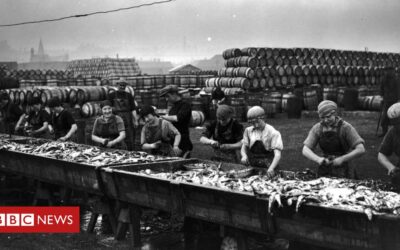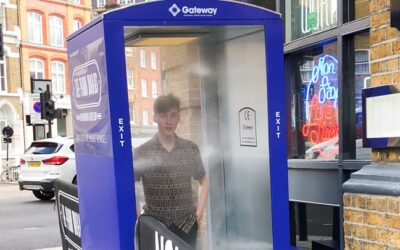The lobby group Renaissance of the East Anglian Fisheries (REAF) has called for a revival of the sector after Brexit and listed an apprenticeship scheme as a key recommendation in its report to the government last October.
BBC Business News Articles
Covid: NME owner says pandemic impact wasn't all negative
As an already reeling music industry is hit by the coronavirus, the owner of UK publication NME says the pandemic has brought challenges and opportunities.Singapore-based BandLab also owns music brands ranging from guitar-making to retail and digital platforms.The virus came at a time of already seismic change for the industry as firms seek new ways to make profits.In recent years, the recording industry has been revolutionised, while instrument and magazine sales fell.The last two decades have seen the business model of traditional record labels massively disrupted by digital downloads, while the market for musical instruments and magazines has been hit by radical changes in consumer behaviour.As the coronavirus pandemic compounded this already hostile business environment, many companies in the music industry have seen their businesses hit hard.BandLab Technology’s chief executive, Meng Ru Kuok, says that while parts of his music-focused firm have faced coronavirus-related disruptions, other areas of the business have thrived.He says that during the pandemic, his music equipment retail business has seen its best e-commerce performance since he bought it in 2012, as social distancing measures mean people have had more free time.”We’ve seen a 300% rise in monthly online sales at our South East Asia music instrument retailer, Swee Lee,” he said.Print vs digitalSome of BandLab’s most high-profile investments have been in music journalism, an industry that has been turned upside down by internet-driven changes in how people consume news.Although the live entertainment and publishing industries have been hit hard by the coronavirus, NME – which BandLab bought in 2019 – was launched in South East Asia last month.
Media playback is unsupported on your device
That announcement came after NME entered the Australian market at the end of last year.Even as plummeting advertising revenues and circulation numbers force increasing numbers of publications to abandon print, NME has recently restarted physical publishing with a monthly magazine in Australia, its only current regular print edition.Mr Kuok says he has a sense of duty to protect the NME’s legacy: “We feel there is a responsibility not just to the brand, but also there is a responsibility of being a credible brand.”And he hinted at new NME-related launches both in the UK and internationally, with announcements expected later this year and in early 2021.The company bought a 49% stake in US rock magazine Rolling Stone in 2016, but sold that holding less three years later after failing to buy the rest of the business.Mark Mulligan from MIDiA Research sees potential for NME as a digital brand: “When NME went fully digital, it was seen by many as the demise of the brand. But of course, in the digital era, print can actually be a hindrance, reducing your ability to reach truly global audiences.”BandLab has an opportunity to entirely re-imagine the brand for a new generation of music fans, with a global reach it previously lacked,” he added.Digital growth At the same time as the company is continuing to expand NME, it is also seeing significant growth in users of its digital music production platform, BandLab.”Today we have more than 22 million people who are using our product around the world. More than eight million songs are being recorded and released a month on the platform,” he said.In another sign of how the music industry as a whole is having to adapt to the new normal of social distancing, BandLab is this weekend holding a virtual guitar show.Guitar.com Live is a three-day event combining a trade show with interviews, panels, workshops and performances by world-famous guitarists.Jamie MacEwan from Enders Analysis said: “A music business like BandLab that connects people with digital production tools and live streaming is well placed to grow its user base under lockdown.”Using the NME brand to reach enthusiasts around the world is a solid strategy. My question would be, how does BandLab intend to monetise and build on its business from here?”Coronavirus disruptionsThe pandemic has also caused significant disruptions in BandLab’s group of businesses.Uncut, another UK-based music magazine owned by BandLab and the firm’s only newsstand-focused product, saw its sales take a hit as people stayed at home because of Covid-19.Meanwhile, the firm’s US-based guitar manufacturers, Heritage and Harmony, were forced to suspend production for eight weeks owing to lockdown measures. Production has now restarted and the company says it has seen a surge in orders, which it is now working to meet.As the son of Kuok Khoon Hong, the chairman and chief executive of Asia’s leading agricultural production group Wilmar International, he is often asked about his billionaire father.While the younger Mr Kuok is quick to point out that his company is separate from the family business, he is also keen to highlight the debt he owes for the guidance he has received over the years.A key piece of advice he says he always keeps in mind is: “When things are going well, don’t be too happy. When things are going badly, don’t be too sad.”From Muse to the bluesSo which artists does a music entrepreneur like Mr Kuok listen to when he’s not working?He nods to his parents encouraging him to learn the violin and piano as a child, but credits his time at one of Britain’s top public schools, Winchester College, and then Cambridge University for his love of guitar music.Growing up listening to British indie bands such as Radiohead and the Libertines, he says his favourite band in his youth was alternative rock group Muse. But now his tastes have matured to include one of the great American bluesmen: “My favourite artist is BB King.””He is someone who has a personality, had trouble in his life and he played to his very last day. Incredibly hard working and had the respect of the entire industry.”
Coronavirus: 'Lockdown was madness but saved us financially'
The coronavirus pandemic has hit the global economy hard, but some people’s personal finances have never looked better.Since the US shut down en masse in March, mum-of-three Paula, who lives in New Hampshire, has paid off some $20,000 (£15,270) in credit card debt the family had racked up in the aftermath of an unexpectedly expensive work relocation. The 35-year-old’s job as an analyst ended in June, but her husband is still working and she benefited from a temporary $600 boost to weekly unemployment payments Congress approved in response to the crisis. She put coronavirus stimulus cheques from the government towards the credit card payments, as well as thousands of dollars the family has saved since their children are not attending day care, preschool or summer camp. Already frugal when it came to eating out, the family has become even more so, she says. Their one big splurge has been bicycles. “The quarantine has been very helpful to save money for us,” she says. “We were at home, which was madness, pure madness but… I think it saved us financially.”Savings surgeThe personal saving rate in the US – an average that reflects the share of income people have put away after spending and tax payments – nearly quadrupled between February and April, when it hit an all-time record of 33.6%. Though lockdowns have eased since then, savings remain unusually high, boosted by government coronavirus assistance. In August, the personal saving rate in the US was 14.1% – greater than any pre-pandemic time since 1975.The rise helped Americans’ household wealth rebound to a record high in the three months to July, while overall debt declined for the first time in 2014. “What’s unique about this situation is that government programmes have supported household incomes but business closures limited their spending opportunities and so we’ve seen… record personal saving rates,” says Sara Johnson, executive director of global economics at IHS Markit.Rich-poor divideThose circumstances are poised to change, however, as government aid runs out.In the US, the $600 expansion to weekly unemployment payments expired at the end of July – and politicians in Washington remain at an impasse when it comes to further relief.People saving more but get little in return
Rules vs fear: What’s delaying economic recovery?
At a hearing in Washington this month, the head of America’s central bank outlined the risks ahead.”Savings are very high,” Federal Reserve chair Jerome Powell said, citing government aid. “But 11 million people are out of work and the risk is that over time, they go through those savings and so their spending will decline, their ability to stay in their homes will decline and the economy will feel those negative effects.”Government support had helped mask sharp differences in how much individual families have managed to put away, but research has found the richest households, who are also less likely to have lost jobs or income, have driven much of the increased saving. As financial support from the government winds down, the divide between rich and poor is expected to grow, as people who have lost jobs are forced to dig into savings to cover their expenses.”People with higher incomes are doing more of the saving and people with very low incomes have been saving a little bit… but there’s an open question about whether that will continue,” says Olivia White, partner at McKinsey & Co, which has surveyed households in 30 countries about pandemic finances. ‘Emergency fund’Meanwhile, economists warn richer households are likely to continue to limit their spending until health concerns are more clearly resolved and the economy is in better shape. In Tennessee, 35-year-old John Kennedy and his wife, who both work in education, have been putting away an extra $2,000 to $4,000 a month since March, thanks to reduced childcare costs, fewer work lunches and coffees, and the elimination of date nights and other entertainment. Some of those expenses, like childcare, will return. But he says he has no plans to start spending more significantly, given the wider economic uncertainty.”We’re saving more than we’ve ever saved and part of it is just because we can, but then the other part is we almost feel like we need to,” he says. “Depending on how things shake out in the next six to 12 months, ideally we’re both employed still but if not then that emergency slash savings fund is just the emergency fund.”The potential for prolonged pullback bodes ill for the rebound in the US, where consumer spending drives more than two-thirds of the economy.”The pandemic has delivered a major hit to consumer spending and it’s really the sector of the economy to watch which signals how the recovery will unfold,” says IHS Markit’s Sara Johnson.Consumer spending started to rebound over the summer, fuelling hopes that the level of savings might power a rapid recovery. But the rate of increase has since slowed.Even if spending were to recover overall, ongoing restrictions in many sectors such as travel, mean those hurt most financially due to the virus won’t be well-positioned to benefit, warns Michaela Pagel, a professor at Columbia Business School.”People cannot spend in those areas where people lost their jobs,” she says. “They cannot generate income for people who really need it.”
Covid-19 left me jobless – but what happened next?
Back in the springtime, when Covid-19 was tightening its grip on the UK, the BBC spoke to a number of people whose jobs were facing the axe as a result of the virus.So how have they fared on the jobs front in the past six months? The BBC went back to talk to them to find out how they are getting on.When Katherine Densham first spoke to the BBC at Exeter airport in early March, she was understandably upset. The airline Flybe, her employer of 13 years, had just collapsed into administration. Cabin crew member Katherine and the good friends she’d made through work were being made redundant.Flybe was described as one of the first corporate casualties of the coronavirus outbreak. A few weeks later, lockdown restrictions were brought in and vast swathes of the UK economy ground to a halt.Half a year later, Katherine’s job search continues. At Flybe, she worked part-time on set days. The youngest of her three children is only two and therefore not yet entitled to free childcare.Finding something similar in her local area has seemed impossible.”You’d think I’d have transferrable skills, but no-one wants to take on part-time staff,” she says. “A lot of the companies I looked at had halted recruitment, because they just didn’t know what would happen.”Other jobs were minimum wage, meaning it would cost me more in childcare to return to work. I used to be well paid, it’s hard to find anything on the same level without going back and retraining.”Her husband works in the hospitality sector. He was furloughed and has now returned to work. But Katherine is finding it hard to be optimistic about her situation.”I just feel really lost. I’ve started decorating the house to keep myself busy. The government keep saying about supporting young people, but what about people who aren’t very young any more? I couldn’t afford to go back to college to retrain now.”However, she adds: “We can still pay the bills for now, so I feel lucky compared to a lot of people.”‘Covid worries’When Junior Stewart from Luton spoke to the BBC in April, he wasn’t sure how he and his family would get by.Previously self-employed, he’d recently got a job in sales. The idea was to provide a more stable income, with his wife expecting their third child. However, at the end of February, he was made redundant, having not been in the job long enough to be furloughed.”While I was looking for work, we were surviving on my wife’s maternity pay and Universal Credit – which took more than five weeks to arrive and didn’t cover our outgoings,” he says.”It was really difficult. Then when she returned to work and was furloughed, the UC disappeared.”He adds: “People did approach me on LinkedIn about work and I had a few final-stage interviews. It felt like employers were being hesitant, they didn’t know what would happen: one employer pulled a job I’d applied for. “Perhaps I could have got a job delivering pizzas, but with a young baby at home, I was worried about catching Covid.”By July, he had decided to learn new skills in the hope of pursuing his own new business venture.”I took an online course and gained a diploma in digital marketing, with a distinction. I don’t think I can put my eggs in one basket by relying on an employer,” he says.He’s now planning to launch an internet marketing training business, in the hope of helping others start their own online enterprises. “I want to help people who are unemployed have something else.”‘Consistent hours’Data from the Office for National Statistics suggests some 695,000 UK workers have disappeared from the payrolls of British companies since March, when the coronavirus lockdown began. The unemployment rate grew to 4.1% in the three months to July,But not all industries have shed jobs. For example, firms which offer delivery services, such as Amazon and Tesco, have recruited more.David Davies from Runcorn has been a driving instructor for 16 years. “The lockdown shut the door on my income,” he says. Given his driving experience, he looked around for supermarket delivery jobs. After a few weeks, he found one with Iceland. “It was still quite hard to get, but I started with Iceland in April. It was initially on a zero-hours basis and I now have a permanent 7.5 hour contract. But I have consistently got over 20 hours a week.”It’s been hard work, but I’ve really enjoyed it. Even now I have been able to give driving lessons again, there’s no way I’m giving up the Iceland job.”Everything’s so uncertain, especially because our area was on the latest list for new coronavirus restrictions. And although it was initially a matter of necessity, I’ve actually enjoyed having both jobs.” ‘Challenging times ahead’Sian Melonie was interviewed by the BBC in May. Her contract for a large cinema group hadn’t been renewed and she did not qualify for the Self-Employed Income Support scheme.Sian spent April, May and June hunting in vain for work, before landing another marketing contract, this time with a large consumer goods company. That will soon end after three months. With a recruitment freeze in place, Sian doesn’t expect it to be extended. “It feels like it’s come about too soon and I’m back where I was in April,” she says.”It’s déjà vu: I’ll be unemployed and there are challenging times ahead again, with further restrictions coming in. But I’ll ask the agency to find another contract. I am trying to stay positive.”The uncertainty over her income and her relationship ending means Sian has decided to give up her current rented flat. “I’m weighing up my options. I don’t want to be forced to move back home, that would feel like a real step back. This has all reinforced my view that it’s important to have savings for times like these.”
Asda bought by billionaire Issa brothers in £6.8bn deal
Two billionaire brothers from Blackburn have won the battle to buy Asda from Walmart of the US, in a deal valuing the supermarket chain at £6.8bn.A consortium of Zuber and Mohsin Issa and private equity firm TDR Capital will take a majority stake in Asda.It means the grocer will return to majority UK ownership for the first time in two decades.The Issa brothers own EG Group, which has more than 5,200 petrol stations across the UK and Europe. A spokesperson for the Issa brothers and TDR Capital declined to comment on how they are funding the deal. Walmart said that, under the new owners, Asda will invest £1bn in the supermarket over the next three years.The auction process for Asda has lasted for several months. Walmart decided to sell a controlling stake in Asda after shelving plans to float the business following a failed £7.3bn merger with Sainsbury’s, which was blocked on competition grounds.Walmart bought Asda in 1999 for £6.7bn and it will retain a minority stake in the supermarket chain.
Media playback is unsupported on your device
Announcing the deal, Walmart said Asda would keep its headquarters in Leeds and its chief executive, Roger Burnley, would remain in place.Asda already has a relationship with the Issa brothers through their petrol forecourt business.The supermarket recently announced its expansion into convenience stores and will initially trial “Asda On the Move” at three of EG Group’s fuel station forecourts in the Midlands.Mohsin and Zuber Issa said they wanted to support Asda’s management to achieve long-term growth.”We believe that our experience with EG Group, including our expertise around convenience and brand partnerships and our successful partnership with TDR Capital, can help to accelerate and execute that growth strategy,” they said. Who are the Issa brothers?The speed of growth of their petrol station business marks the Issa brothers out as “remarkable entrepreneurs”, according to Brian Madderson, chairman of the Petrol Retailers Association (PRA), of which their EG Group is a member.The rapid expansion came as the major oil companies sold off or closed their High Street petrol outlets to concentrate on production and refining. Industry insiders describe the brothers as softly spoken and modest. At one industry awards ceremony several years ago, the brothers were present but were said to be too shy to claim their award on stage. People who know them say that part of their success is in remaining curious about competitors and being willing to learn and pick up new ideas.The Sunday Times values their fortune at £3.56bn.Read more about Zuber and Mohsin Issa here.Initially called Euro Garages, the Issa brothers founded EG in 2001, expanding it from a single site in Bury, Greater Manchester. TDR Capital now owns half of the group, with Zuber Issa controlling 25% and Mohsin Issa the remaining 25%. Walmart said it expected to report a $2.5bn (£1.9bn) loss for its next financial year “reflecting the absence of net income associated with the Asda business”.It added that the “use of cash proceeds” from the sale “will be determined at a later date”.
US jobs growth slower than expected in September
The US added fewer jobs than expected in September in a sign that America’s rebound from the economic collapse triggered by the coronavirus pandemic is slowing.Employers added 661,000 jobs against the more than 800,000 expected.The jobless rate fell to 7.9%, dropping for a fifth month, but the minority workers hit hardest saw little change.The gains mean the US has recovered more than half the 22 million jobs lost in March and April amid lockdowns.But the figures from the US Labor Department on Friday showed the smallest increase in jobs since employment started picking up again in May.While restaurants and retailers added positions, the number of people on public payrolls, which had seen a boost in August from temporary hiring for the US census, dropped, particularly in education.Despite the gains, the jobless rate remains far higher than the 3.5% the US enjoyed in February. ‘Sobering statistic’Friday’s figures are the last monthly update on the labour market before the presidential election in November, and come as politicians in Washington remain mired in debate over a further stimulus deal. While the initial recovery was stronger than many analysts expected, economists have warned of the risk of a slowdown, as the burst of hiring from the initial reopening fades and government support for businesses and unemployed households winds down.”The easy part of the labour market recovery is largely behind us now,” said Brian Coulton, chief economist at Fitch. “A lot of jobs still came back in September but the pace of improvement is clearly slowing. The sobering statistic here is that 36% of unemployed are now classed as permanent job losers, up from 14% in May.” Just this week, Disney announced it would shed some 28,000 workers, including many at its parks in Florida and California, while major airlines announced they would move forward with more than 30,000 cuts. The economic collapse has fallen most heavily on African American and Hispanic workers, whose jobless rates remain higher than that of white workers. Last month, the unemployment rate for black workers stood at 12.1%, while that of Hispanics was at 10.3%, compared with 7% among white workers, the Labor Department said.And worryingly, the overall decline in the unemployment rate from 8.4% in August was driven partly by a drop in the number of people in the labour force, as roughly 700,000 stopped working or looking for work entirely.The participation rate was 61.4% in September, down from 61.7% a month earlier and lower than any pre-pandemic time since the 1970s.”The slowing momentum in the labour market bodes poorly for the broader recovery and points to increasing scarring effects from the crisis,” said Kathy Bostjancic, chief US financial economist at Oxford Economics.
The 'remarkable entrepreneur' brothers who bought Asda
Two UK billionaire brothers – who made their money in petrol stations – have succeeded in buying UK supermarket giant Asda from US owners Walmart.Zuber and Mohsin Issa, 48 and 49, started their business with a single petrol forecourt in Bury, Greater Manchester, in 2001.Now their business, EG Group, owns more than 5,200 petrol stations, mainly in Europe and the US, and employs more than 33,000 people.The speed of growth marks out the brothers as “remarkable entrepreneurs”, says Brian Madderson, chairman of the Petrol Retailers Association (PRA), of which EG Group is a member.The expansion came as the major oil companies sold off or closed their High Street petrol outlets to concentrate on production and refining. The supermarkets – including Asda – saw an opportunity to drum up customers by adding petrol stations to their stores. But the Issas saw an opportunity to add more retailing to their petrol stations. It was a “huge opportunity,” Mr Madderson said. While motorists have been able to pick up a fizzy drink or a pack of gum with their fuel for decades, they are now being offered fast food, takeaway coffee and groceries. One of their newest sites, near their hometown of Blackburn, is a four-acre service station and features a drive-through KFC, Starbucks and Greggs, as well as a Spar convenience store, a BP-branded petrol station and electric charging space.Said Mr Madderson: “When the rest of the market was quaking in their boots at the tough stance of the supermarkets, the brothers said: ‘OK, if people want cheap petrol and can afford the time to find a supermarket, good for them, we will focus on high quality for motorists on the move’.” Industry insiders describe the brothers as softly spoken and modest. At one industry awards ceremony several years ago, the brothers were present but were said to be too shy to claim their award on stage. People who know them say that part of their success is in remaining curious about competitors and being willing to learn and pick up new ideas.£20m donationThe brothers own 50% of their enterprise between them, split equally, with the other half owned by TDR Capital, an €8bn (£7.3bn) investment firm which owns David Lloyd gyms.The Sunday Times values their fortune at £3.56bn.They donate 2.5% of their wealth each year to their own charitable foundation, which funds projects in the UK and abroad. In 2019 they donated £20m.They courted controversy in their home town when they bought eight homes, demolished them and began building five mansions, raising the ire of neighbours, the Lancashire Telegraph has reported. In 2017, they reportedly bought a £25m home in London’s upmarket Knightsbridge.For the Issas’s purchase of Asda, a chunk of the bid is likely to have come from their own money, believes independent retail analyst Richard Hyman.”The world has become too corporate,” said Mr Hyman. “This is the kind of economy and business climate where there’s not enough entrepreneurialism.”As yet specific details about the Walmart purchase have still to be revealed.Electric opportunitiesMr Hyman cautions that while Asda can be improved by an enterprising eye, there is no “massive prize” in buying a big supermarket. “This sector is going to get more intensely competitive than it’s ever been,” he says, with Lidl, Aldi, B&M – which plans to open 45 new stores this year – and Home Bargains all taking custom from them. In the UK, EG Group has 386 sites, making it the second-biggest independent petrol retailer behind Motor Fuels Group, which has more than 900 locations, according to data from the PRA.The market in the UK totals about 8,350 forecourts. About 1,500 are operated by supermarkets, with another 1,500 owned by large oil firms such as Shell and BP. The remainder are owned by independents.In 2019, EG Group reported sales of €20bn (£18bn), up from €12bn a year before. While fuel accounted for €16bn of sales, the business is geared towards adding on other sales, from brands including including Subway, Burger King and French supermarket Carrefour. Borrowing costs on €8bn of debt pushed the firm into a fiscal loss for the year, of €496m. The firm has about £9 of debt for every £1 of cash earnings, says Azhar Hussain, head of global credit at Royal London Asset Management. Most companies would have £3-6 of debt for each pound earned before eyebrows are raised and questions are asked about repayment, he said.But the businesses EG Group has bought with its borrowings are making plenty of cash, which appears to be putting lenders at ease, he said. “They are a high-risk company with a lot of debt and therefore their strategy is absolutely key,” he said. “But it looks like that strategy is working.”Although more people are buying electric cars, petrol and diesel still dominate the market. Still, the company has said on its website that it will “capitalise” on the demand for new fuels. The company’s large forecourts provide good space for fast electric charging, it says.
Post Office scandal: Postmasters celebrate huge victory against convictions
Dozens of former sub-postmasters and postmistresses should get a clear path in quashing their convictions for fraud, theft and false accounting.They were convicted of stealing money after the Post Office installed a new computer system, with some imprisoned.Many have now been told the Post Office will not contest their appeals against conviction.For years, their criminal record put some of those affected in dire financial circumstances. Some struggled to secure work, lost their homes, and even failed to get insurance owing to their convictions, but they always said the fault was in the computer system.The Post Office said it would not oppose 44 out of 47 appeals. The decision makes it almost certain that convictions will be quashed, although Court of Appeal judges must decide and the Post Office can seek a retrial. More cases remain under scrutiny.Jo Hamilton is one of the people who has been told that the appeal against her conviction will not be contested.”Twelve years I’ve been battling and it’s just drained us. We’ve been fighting to prove we were innocent. There it is in black and white. I’m not a criminal,” she said.”It’s just gone on for so long. It’s been a massive part of my life.”Community supportMrs Hamilton was accused by the Post Office of taking £36,000 from the village shop she ran in Hampshire.She said issues in the Horizon computer system led to big discrepancies in her accounts, which she reported to her Post Office area manager. But that manager could find nothing wrong with the system, and she was put in a situation where “you had to prove your innocence”.After a distressing two-year process, she eventually pleaded guilty to false accounting at Winchester Crown Court in order to escape a more serious charge of theft.She had to give up her shop and found it difficult to get a new job due to her criminal record. Declaring the criminal record also affected everyday life, such as failing to get car insurance. She made ends meet by doing cleaning jobs for people in her village who did not believe she was guilty. Many of them, including the local vicar, came to support her at her sentencing hearing.
Media playback is unsupported on your device
Another former sub-postmistress, Seema Misra, was pregnant with her second child when she was convicted of theft and sent to jail in 2010. She was in tears after being told her appeal would not be contested, saying that she had been “suffering” for 15 years as a result of the case.”Prison was my worst nightmare. I never thought of giving up,” she said. “I’m so, so happy. Justice has been done. I can now proudly say my name.”The Post Office agreed in December to pay almost £58m to settle the long-running dispute with more than 500 sub-postmasters and postmistresses affected by the scandal, many of whom had been fired or made bankrupt as a result.The settlement brought an end to a mammoth series of court cases over the Horizon IT system used to manage local post office finances since 1999.Earlier this week, the government announced that retired judge Sir Wyn Williams would lead the inquiry into the Post Office’s failings after repeated calls for a judge-led, full public inquiry. What is the Horizon computer scandal?The Horizon system, developed by the Japanese company Fujitsu, was first rolled out in 1999 to some post offices to be used for a variety of tasks including accounting and stocktaking. But from an early stage it appeared to have significant bugs which could cause the system to misreport, sometimes involving substantial sums of money. It was difficult for sub-postmasters to challenge errors because they were unable to access information about the software to do so. After more than 900 prosecutions, 550 sub-postmasters raised civil actions against the Post Office which agreed to pay £58m damages.The English Criminal Cases Review Commission (CCRC) has referred 47 convictions brought under Horizon evidence to the Appeal Court. The Director of Public Prosecutions is also considering whether there should be charges of perjury against officials who claimed in court there were no problems with Horizon, even though emails and other documents now suggest they knew there were.Listen to the background of the saga – The Great Post Office Trial on BBC Sounds
Solicitor Neil Hudgell, who represented 33 of the sub-postmasters, said the Post Office’s decision not to contest appeals would have wider implications. “[This] is a landmark moment, not only for these individuals, but in time, potentially hundreds of others. The door to justice has been opened,” he said. “We are today obviously delighted for the people we represent. Clearing their names has been their driving goal from day one, as their reputations and livelihoods were so unfairly destroyed.” Six cases which were only heard by magistrates do not go to the Court of Appeal but instead to another hearing at the Crown Court, but the Post Office will not offer any evidence, which will mean they will be cleared.Tim Parker, chairman of the Post Office, said: “I am sincerely sorry on behalf of the Post Office for historical failings which seriously affected some postmasters. “Post Office is resetting its relationship with postmasters with reforms that prevent such past events ever happening again.”
Meet the teens who developed a dementia app which uses music
A group of Nigerian-Irish teens have developed an app which uses music to comfort those living with dementia. Rachel, Margaret and Joy were worried about how people with dementia were coping during lockdown, so they decided to design and code Memory Haven. The app has already won a prize at the prestigious technology competition, Technovation, beating 1,500 other entries from across 62 countries worldwide.Produced by Keisha GitariEdited by Francis Adikpe Filmed by David O’Beirne
US shares set to drop after Trump tests positive
US stock markets have indicated that shares will open sharply lower after Donald Trump said he had tested positive for coronavirus.Stock market futures showed that all three of America’s main indexes – the Dow Jones, the S&P 500 and the Nasdaq – are set to drop by at least 1.5% each when trading begins on Friday.The US President tweeted he and his wife Melania had contracted Covid-19.It comes as the US heads into the final weeks before the Presidential election.Mr Trump tweeted: “Tonight FLOTUS [First Lady of the US] I tested positive for COVID-19. We will begin our quarantine and recovery process immediately. We will get through this TOGETHER!”Hours earlier, Mr Trump had declared that the end of the coronavirus pandemic “is in sight”.US election 2020: Fact-checking Trump on coronavirusFutures trading indicates that the Dow Jones could drop by nearly 500 points when it opens later. The technology-heavy Nasdaq is set to tumble by 2% while the S&P 500 is on course to fall 1.7%.”It is prime time now for (the) US election,” said Jingyi Pan, a senior market strategist at IG Group. “Should the President be absent during this period, that could mean even more complications with the election.”Mr Trump and his Democratic rival, former Vice President Joe Biden, are scheduled to hold two more debates ahead of polling day on 3 November. Earlier this week, the two faced each other for the first time in a combative encounter. The rules for the remaining debates has now been changed to ensure the two remaining meetings will be more orderly.










